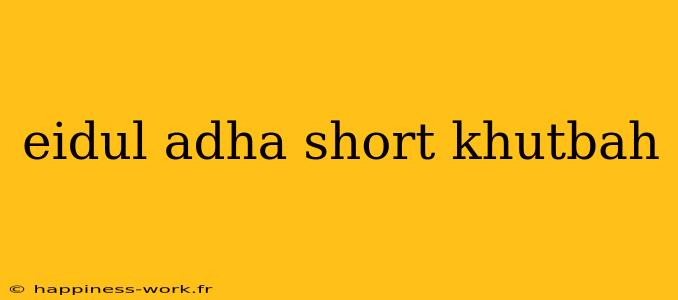Eid ul-Adha, also known as the "Festival of Sacrifice," holds profound significance in the Islamic calendar. It commemorates the willingness of Prophet Ibrahim (Abraham) to sacrifice his son Isma'il (Ishmael) in obedience to God's command. This festive occasion is not only a time for celebration but also an opportunity for spiritual reflection and communal unity. Below is a short khutbah (sermon) suitable for this occasion.
Introduction
Bismillah ir-Rahman ir-Rahim (In the name of Allah, the Most Gracious, the Most Merciful). All praise is due to Allah, who has granted us another opportunity to gather in His remembrance and worship on this blessed day. May His peace and blessings be upon our beloved Prophet Muhammad (peace be upon him), his family, and his companions.
Importance of Eid ul-Adha
Eid ul-Adha is a reminder of the trials and tribulations faced by Prophet Ibrahim and his ultimate submission to Allah's will. It teaches us the values of sacrifice, obedience, and compassion. Allah says in the Quran, Surah Al-Hajj (22:37):
"It is neither their meat nor their blood that reaches Allah; rather, it is your piety that reaches Him."
Reflection on Sacrifice
When we participate in the act of Qurbani (sacrifice), we are reminded of our duties towards those who are less fortunate. It is not just an act of slaughtering an animal; it is a manifestation of our faith and commitment to serve humanity. We are encouraged to share our blessings and support those in need, reinforcing the bond of brotherhood in our communities.
Community and Unity
Eid ul-Adha also strengthens the sense of community among Muslims. Coming together for prayers, sharing meals, and giving to charity fosters relationships and encourages us to work towards a common purpose. It is an occasion where we can set aside our differences and unite in gratitude and service to Allah.
Practical Examples of Sacrifice
-
Financial Sacrifice: Many of us are blessed with financial resources. Sacrificing a portion of our wealth for the benefit of others—be it through Zakat (charity) or helping local charities—can have a profound impact on the lives of those who are struggling.
-
Time and Effort: Consider volunteering your time at local community centers, helping in food drives, or supporting educational initiatives. This type of sacrifice builds a strong foundation for a compassionate society.
-
Personal Growth: Sometimes, the greatest sacrifices are those we make within ourselves. Striving to overcome personal flaws, such as impatience or anger, reflects our commitment to better ourselves in the sight of Allah and for the sake of our loved ones.
Conclusion
As we celebrate Eid ul-Adha, let us renew our intentions and strengthen our commitments to act in obedience to Allah. May our sacrifices, both great and small, be accepted. Remember the essence of this day is not just in the ritual but in embodying the spirit of sacrifice, generosity, and unity.
Dua: I ask Allah to grant us the ability to embody the teachings of this beautiful occasion. May He help us to be compassionate, generous, and obedient servants. Ameen.
Additional Resources
For those looking to delve deeper into the teachings and significance of Eid ul-Adha, consider the following resources:
- Books on Islamic History: Understanding the life of Prophet Ibrahim and the lessons we can learn from it.
- Local Community Events: Participate in local charity events during Eid, reinforcing community ties and fostering a sense of belonging.
- Online Lectures: Many scholars provide insightful lectures on the importance of sacrifice in Islam.
SEO Keywords
- Eid ul-Adha Khutbah
- Significance of Eid ul-Adha
- Lessons from Eid ul-Adha
- Islamic community celebrations
- Importance of sacrifice in Islam
By keeping these values at the forefront, Eid ul-Adha can be a source of immense spiritual upliftment and social responsibility.
This article was inspired by ideas commonly discussed on platforms such as WikiHow. For more detailed guidance on the rituals and significance of Eid ul-Adha, consider exploring WikiHow's articles on similar topics (Authors: Various contributors).
